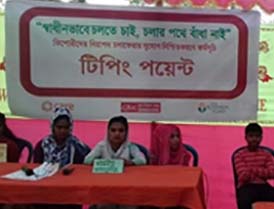
Sanjida is a youth activist living in Pirgacha, Rangpur. She is part of the Fun Center* under Tipping Point project**. She is a student of ninth grade in Mangalakuti Girls’ School. While the school is near her village, the route itself to school is not too easy for the girls in this region. There is a local market on the way to the school and girls like Sanjida face daily harassments from local boys who tease them, pass vile comments. Being a member of fun center Sanjida had means to get help with this problem. With technical and logistical support from Tipping Point project, she and her friends were able to arrange a discussion in the village titled ‘Discussion to make unsafe places safe for girls.
Many important community members including the current Union Parishad Chairman, former Union Parishad Member, Female Ward Members, President of Bazar Committee, School’s Headmaster and other influential members of the community attended the discussion organized by Sanjida and her group. The objective of this program was to ensure that girls like Sanjida should be able to move freely while going to school, coaching centers or to the market. Sanjida and other participants in this discussion shared their problems, specially about the boys who disturb them and why this makes them feel insecure. Everyone who attended this discussion listened to their concerns earnestly and committed to support them in achieving safety in their neighborhood.
“However, even after 1 week of that event, we could not go to school, private or coaching without fear. The boys used to tease us in different ways, catcall and say bad things. Anytime we confronted them, they would simple deny doing anything as such. This was getting out of control.”, shared Sanjida. “In our group, we again tried to come up with another problem and this time, we took the matter to Haider Ali (a former commissioner), our school teachers, Imam (religious leader) of the mosque, the father of the adolescent boys who own shops at local market, and also other notable people in the village. They kept the matter in mind and this time they kept closely observed the boys who used to disturb us”, added Sanjida.
Since the community members were well alerted about the eve-teasing problem everyone was very observant. Anytime anyone tried harassing these girls, they would immediately get confronted by the elders in the community. Gradually the boys who were disturbing Sanjida and her friends realized the gravity of the situation and stopped this disrespectful attitude. With the support from the elders and respected members of the community, Sanjida and her friends now have the safety and freedom to move without being harassed. “All this has been possible because I received awareness raising messages on harassment and violence against women and girls from the fun center. This helped us understand that what these boys were doing was wrong and some hard actions were required to end this”, shared Sanjida.
With efforts and initiatives such as this, CARE Bangladesh is creating hundreds and thousands of change agents all over the country, who are future advocates social change and justice, gender equality and women empowerment.
*Fun center is an initiative under Tipping Point’s Girls' Collectives intervention. The core objective of this space is to create an enabling and safe place for adolescent girls (12-under 16) to develop their leadership and participation qualities so that they can lead social movements to reduce violence and inequality against women and girls. This is a physical space that provides girls a supportive social network where important issues related to health and well-being are discussed and encouraged.
**The multi-country Tipping Point project addresses child marriage through a dynamic process of innovation, insight, and influence through advocacy in Nepal and Bangladesh. The Initiative focuses on identifying the root causes of child marriage and facilitates innovative strategies to create alternative paths for adolescent girls. Grounded by this work, the Initiative also seeks to influence the way policymakers, donors, researchers, and civil society approach the issue of child marriage, specifically to steer the global discourse beyond short-term solutions. The Initiative works with adolescent girls and boys, parents, community and religious leaders, and nationally with networks of social activists, experts, and government agencies. These areas are both geographically and economically isolated from other regions. CARE expects this learning and innovation initiative to contribute to global understanding of the complex issues driving child marriage and strategies that can contribute to a “tipping point” of sustainable change to prevent child marriage and create viable alternative paths for adolescent girls.